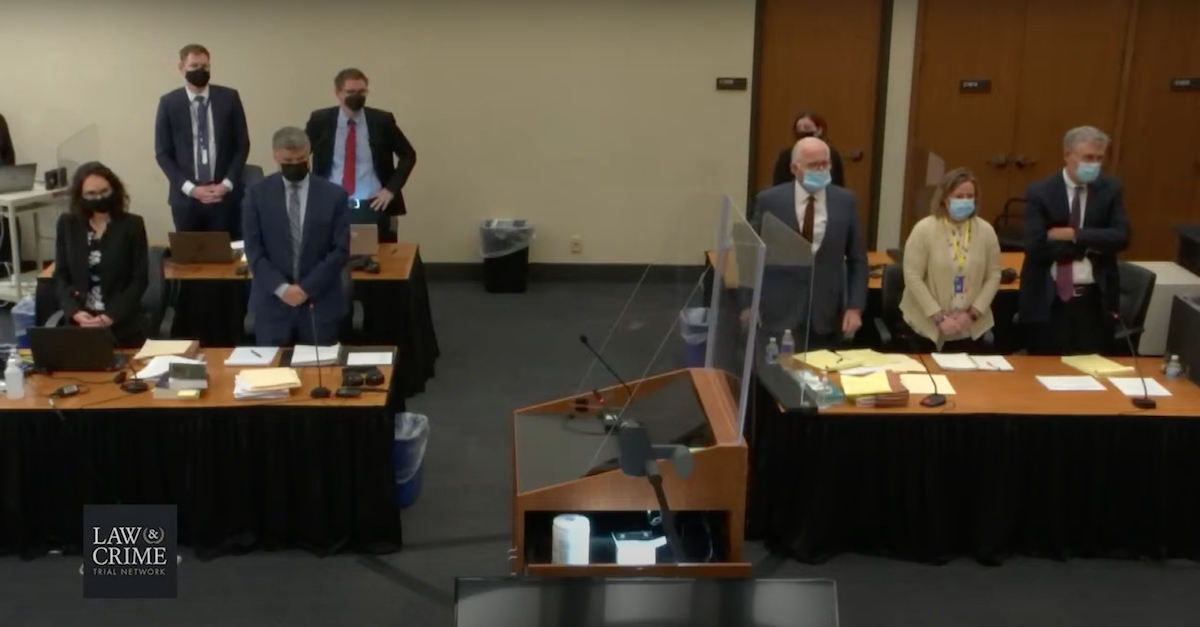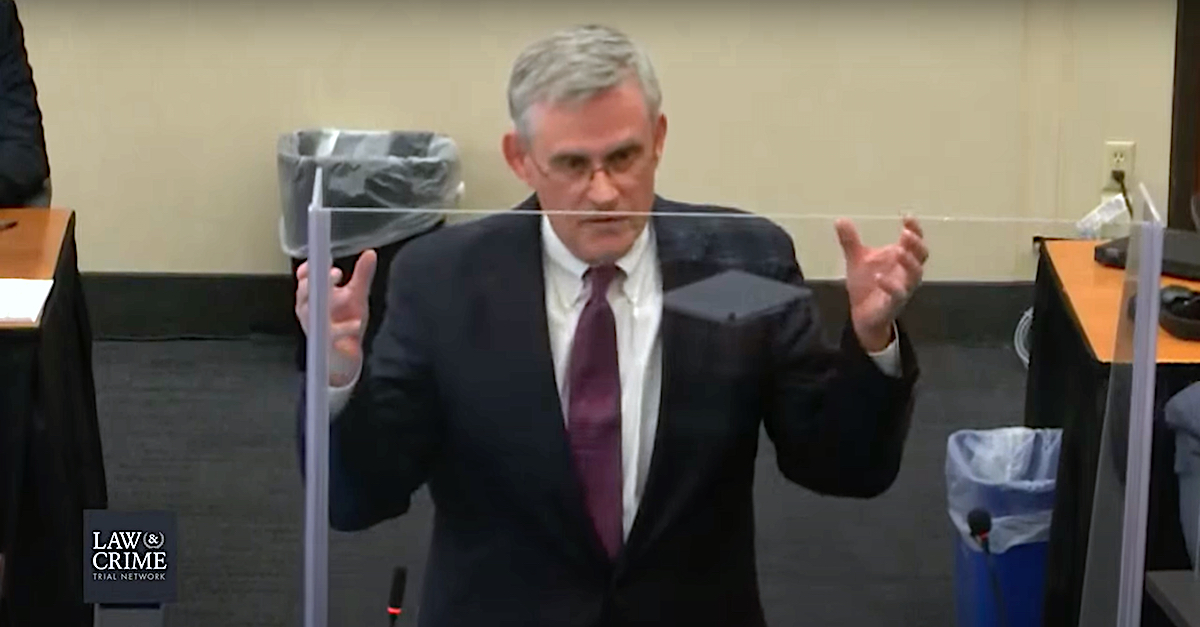
Defense attorneys for ex-Brooklyn Center, Minn. police officer Kimberly Potter on Wednesday blamed Daunte Wright for his own death. During opening statements before a jury empaneled to determine whether Potter is guilty of second-degree manslaughter or first-degree manslaughter, the defense said Wright should have complied with a group of at least three officers who tried to take him into custody and that Potter drew her weapon to prevent harm — perhaps even death — to the other officers on the scene.
“She said, ‘I’ll tase you! I’ll tase you!’ The language was direct; it was clear; it was unmistakable,” said defense attorney Paul Engh. “All Mr. Wright had to do was stop. He was told he was arrested on a warrant. He resisted; she said, ‘I’ll tase you!’ All he had to do was surrender.”
“But that wasn’t his plan,” Engh added. “He continued on with his struggle.”
The defense said that if Wright took off, he may have harmed or killed the other officers on the scene.
“If she does nothing, Mr. Wright drives away and either substantially harms Sgt. [Mychal] Johnson or, more likely, he kills him,” Engh said.
“All he had to do is stop, and he’d be with us,” Engh said emphatically. “But he goes. She can’t let him leave because he’s going to kill her partner!”
“She pulls the trigger believing that it was a Taser,” Engh continued.
The defense attorney noted that Potter pulled the trigger but a single time. The training for a gun is to pull the trigger two times.
“She realizes what has happened — much to her everlasting and unending regret,” Engh continued. “She made a mistake. This was an accident. She’s a human being. She had to do what she had to do to prevent a death to a fellow officer, too.”
Engh then waxed poetic about the “distinguished court” in which he was practicing and how “great” it was to be a defense attorney in America — where a trial by a jury of one’s peers is a constitutional guarantee.
Engh then prefaced a lengthy discussion about the officers on the scene: “they have lives; they have careers; and you should know more about them.” What followed was a lengthy recitation of Potter’s life and resume. The defense attorney said Potter and her husband have two children — one of whom is in the Marine Corps and the other of whom plays hockey. Engh said Potter’s life’s aspiration was to be a police officer and that Potter served on an “honor guard” who served as a pallbearer for other officers who were killed in the line of duty.
“Over the course of 26 years, she never fired a gun,” Engh said. “She never fired one shot. She never fired a Taser. She never needed to. She always deescalated everything.”

A wide shot shows defense attorneys (right) flanking former police officer Kimberly Potter during her criminal trial in Minnesota on Dec. 8, 2021. Prosecutors are standing at left. Judge Regina M. Chu ordered that television cameras could not record close-up images of the defendant or the attorneys as they stood near counsel tables. Exceptions to that prohibition apply during the reading of a verdict. (Image via the Law&Crime Network.)
Contrary to the state’s insinuations that Daunte Wright was engaged in minor or perhaps even forgivable conduct, Engh said Wright’s rear view mirror air freshener, expired tags, lack of insurance, and ultimate arrest warrant indicated to Potter and her fellow officers that the situation they encountered was escalating in severity beyond a mere minor infraction.
“This changes the equation,” Engh said. “The warrant is for a gun charge. A gun charge! It’s a gross misdemeanor.”
Luckey was concerned about his safety, Engh said.
“There’s a substantial chance — he’ll tell you — that there’s now a gun in the car because the guy’s got a gun warrant,” Engh said of Luckey’s forthcoming testimony. “He’ll tell you — he thought — there was a substantial chance Wright either had a gun either on his person or in the left container of the car in the door way, or in the console, which is where you hide the guns. He’s alerted.”
No gun was found, prosecutors said.
Engh said the state failed — or refused — to tell the jury that a female secured an order of protection against Wright and that an active harassment order was out in Wright’s name. That, Engh said, indicated to the officers that Wright was violent.
Police procedure also required the officers to check and make sure the woman who swore out the complaint against Wright was safe, the defense attorney indicated.
“A court of law directed him [Luckey] to arrest him [Wright]! It has nothing to do with a license tab! It has to do with a court order from this district!” Engh said — raising his voice and pounding his podium while emphatically and boisterously refuting the state’s theory that the police unnecessarily escalated the encounter.
“This is standard police work!” Engh later said. “No fault can be had for the strategy here!”

Paul Engh, a defense attorney for former officer Kimberly Potter, gives an opening statement on Dec. 8, 2021. (Image via screengrab from the Law&Crime Network.)
The defense said “in hindsight” it might have been better to arrest Wright away from the car, but he said officers will testify that they usually make arrests at vehicle doorways.
The defense noted that officers warned Wright not to “tense up” and told the victim “don’t do it, bro.”
Wright wanted to “escape,” Engh said. The defense continued by again referencing the officers’ legal duty to take Wright into custody given the warrant:
Johnson enters the car. Johnson holds, as I say, the gear shift so he [Wright] can’t drive. Luckey’s trying to hang on. At this point, he has to be stopped. He can’t just drive away because the police officers know that fleeing a police officer is also a felony. And fleeting at a dangerous speed — which you saw on the video — is a dangerous felony. It’s a crime of violence. They also know they can’t let him go. They can’t. The court has said: arrest him.
“If this guy drives away, he’s dead,” Engh said while referencing Potter’s gaze on Johnson’s arm within the car. “He’s dead,” the defense attorney again repeated.
The defense then said the jury needed to consider whether Potter gave any “conscious thought” as to whether she was holding a Taser or a gun.
“She believed that she possessed a Taser,” the defense attorney continued. “She didn’t say ‘gun, gun, gun.'”
The prosecution objected several times because the defense was characterizing the legal ramifications of the defendant’s conduct. The judge overruled the objections but cautioned Engh to “stick to the facts.”
Engh continued by saying testimony from fellow officers and by expert witnesses would show that Potter’s actions were justifiable given the risk Wright posed to the other officers on the scene. He also repeatedly referred to Potter’s hoisting of a gun, not a Taser, as an “error” of the type human beings tend to make.
“Ms. Potter’s good name has been besmirched by this allegation, which is not true, and by the press coverage, which has been slanted, and we seek to reclaim it,” Engh said while asking for a not guilty verdict. “And reclaim it we will.”
The defense repeatedly indicated that Potter would testify.
The judge overseeing the case ruled in the lead-up to the trial that cameras would not be allowed — then changed her mind. However, the video cameras present are not allowed to capture close-up images of the defendant while she is seated at a table with her attorneys. An exception exists for when the verdict is read.
Law&Crime’s coverage of the state’s opening statement appears in a separate report available here.
[images as noted]